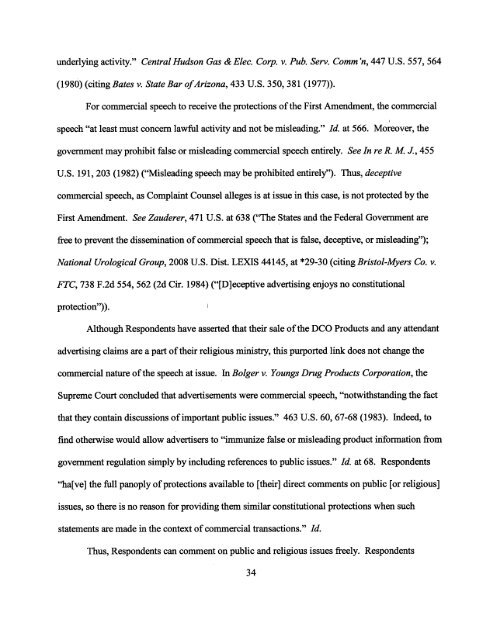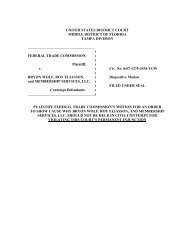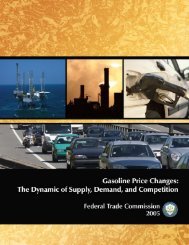Complaint Counsel's Post Trial Brief - Federal Trade Commission
Complaint Counsel's Post Trial Brief - Federal Trade Commission
Complaint Counsel's Post Trial Brief - Federal Trade Commission
You also want an ePaper? Increase the reach of your titles
YUMPU automatically turns print PDFs into web optimized ePapers that Google loves.
underlying activity." Central Hudson Gas & Elec. Corp. v. Pub. Servo Comm 'n, 447 U.S. 557, 564<br />
(1980) (citing Bates V. State Bar of Arizona, 433 U.S. 350, 381 (1977)).<br />
For commercial speech to receive the protections of<br />
the First Amendment, the commercial<br />
,<br />
speech "at least must concern lawful activity and not be misleading." Id. at 566. Moreover, the<br />
goverent may prohibit false or misleading commercial speech entirely. See In re R. M. J., 455<br />
U.S. 191,203 (1982) ("Misleading speech may be prohibited entirely"). Thus, deceptive<br />
commercial speech, as <strong>Complaint</strong> Counsel alleges is at issue in ths case, is not protected by the<br />
First Amendment. See Zauderer, 471 U.S. at 638 ("The States and the <strong>Federal</strong> Goverent are<br />
free to prevent the dissemation of commercial speech that is false, deceptive, or misleading");<br />
National Urological Group, 2008 U.S. Dist. LEXIS 44145, at *29-30 (citing<br />
Bristol-Myers Co. v.<br />
FTC, 738 F.2d 554,562 (2d Cir. 1984) ("(D)eceptive adversing enjoys no constitutional<br />
protection")).<br />
Although Respondents have assered that their sale ofthe DCO Products and any attendant<br />
adverising clais are a par of their religious mistr, this purorted lin does not change the<br />
commercial natue of the speech at issue. In Bolger v. Youngs Drug Products Corporation, the<br />
Supreme Cour concluded that advertisements were commercial speech, "notwithstanding the fact<br />
that they contain discussions of<br />
important public issues." 463 U.S. 60, 67-68 (1983). Indeed, to<br />
fid otherwise would allow adverisers to "immunze false or misleading product iriformation from<br />
goverent regulation simply by including references to public issues." Id. at 68. Respondents<br />
"ha(ve) the full panoply of<br />
protections available to (their) direct comments on public (or religious)<br />
issues, so there is no reason for providing them simlar constitutional protections when such<br />
statements are made in the context of commercial transactions." Id.<br />
Thus, Respondents can comment on public and religious issues freely. Respondents<br />
34

















